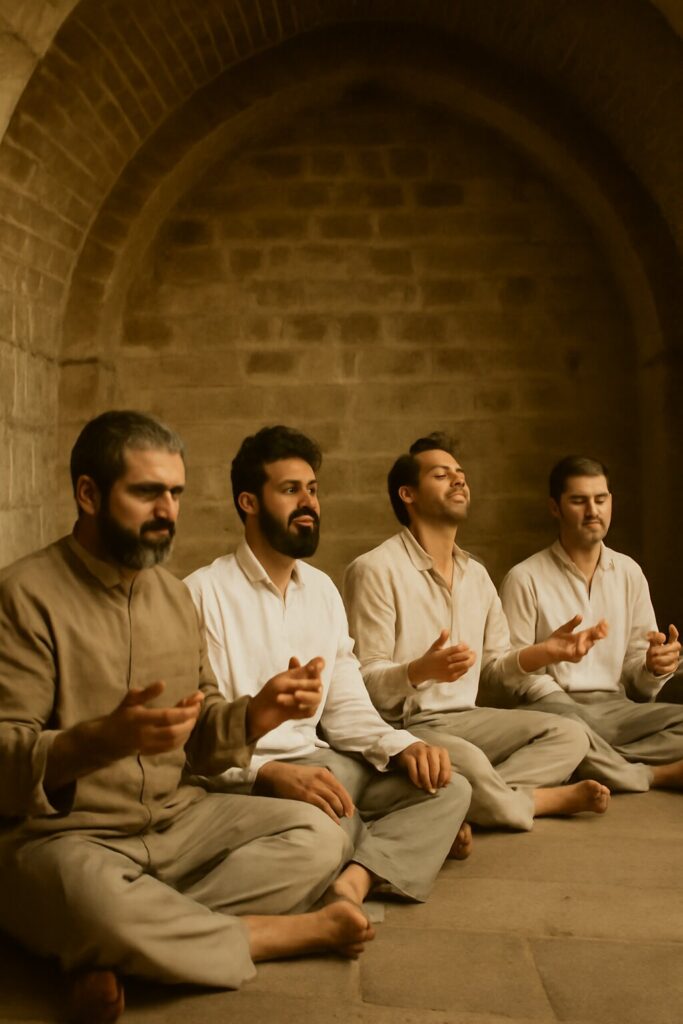The Listening in the Khasnazi Method
Listening (sama) is receiving sounds of all kinds through the ear, where sound waves transfer from their primary sources, such as drums, tambourines, and other musical instruments. The human soul is deeply inclined towards sweet sounds, especially during remembrance circles (dhikr), reciting poetry, or praising the Prophet ﷺ. When the voice is sweet and pleasant, and the poetry is delivered in an impactful way, souls are quickly drawn into spiritual ecstasy, accompanied by deep spiritual effects.
Effect of Listening on Souls:
When the sound is sweet, melodious, and smoothly performed, souls are quickly affected, and the disciple (mureed) experiences a state of spiritual ecstasy resulting from the dhikr and the presence of the spiritual guides. This spiritual ecstasy is achieved through the interaction of souls with each other, and the disciple enters a state of bliss and spiritual presence, moving between new realms filled with spiritual peace. As mentioned in the Quran: **(Rejoicing for what Allah has given them)**【1】, the disciples sway and glorify in the heavenly realm, as indicated in the verse: **(Indeed, the hearing, sight, and heart – about all those [the one responsible])**【2】.
Prophet ﷺ’s Experience with Listening:
The importance of listening is reflected in the Prophet ﷺ’s reactions when he heard religious poetry, where his blessed body swayed, and his cloak fell when he heard the following verses:
“O you who love the groaning of the servant and regret
O you who has the remedy for pain and suffering
The mother of eyes and the servant’s eye is vigilant
Crying at your door in the darkness of the night
Do not cut off my hope in You, O my Eternal Refuge
O Forgiver of sins for those who seek Your mercy
Have mercy with Your grace and do not look at my deeds
Verily, the generous is one who forgives his servants abundantly.”
Following this, Jibreel (Gabriel) عليه السلام descended to inform the Prophet ﷺ that Allah sends him peace and requests a piece of the cloak to be hung on the Throne.
Definition of Listening from the Perspective of the Methodology
Definition of Listening:
The views of scholars and spiritual guides regarding the definition of listening in the Khasnazi method vary. Dhul-Nun Al-Misri said: “Listening is a process that disturbs the hearts towards the truth,” while Junayd Al-Baghdadi said: “Listening is a trial for those who seek it and a promotion for those who experience it.” According to Muhammad ibn Ali Al-Baqir عليه السلام, listening is considered evidence of the life of the hearts, a sign of spiritual purity, and a rise above worldly desires.
Traditional vs. Real Listening:
- Traditional Listening: Refers to what individuals do when they attempt to imitate Sufis to resemble their spiritual states, which leads to emotional reactions to the sounds of listening.
- Real Listening: Arises from listening to words that deeply affect the heart and resonate with their spiritual meanings, as indicated in Allah’s statement: **(So give good news to My servants who listen to the word, then follow the best of it)**【10】.
Views of the Khasnazi Sheikhs
Sheikh Abdul Wahab Al-Sharani’s Views:
Sheikh Abdul Wahab Al-Sharani divided listening into two types:
- Traditional Listening: Occurs when a person tries to mimic what others do in the world of Sufism.
- Real Listening: This type of listening affects the heart and elevates the soul, and must engage the pure hearts in contemplation of the received words.
Listening in the Quran and Sunnah:
Many verses in the Quran support the concept of listening and its spiritual effect, such as the verse: **(Those who listen to the word, then follow the best of it)**【10】, which indicates listening to pleasant sounds associated with the correct meaning that elevates the soul.
Listening According to Imam Al-Ghazali
Imam Al-Ghazali’s Concept of Listening:
Imam Al-Ghazali begins his discussion on listening by saying: “Both the text and analogy indicate its permissibility.” He affirms that listening should be pleasurable and stimulate the mind and thought, and it is permissible if the sound is pleasant and harmonious. He also stated: **”Allah never sent a prophet except with a pleasant voice”**【3】.
Divisions of Listening:
- Good Sound: This is the sound that evokes a response in the heart, including the sounds of birds, flutes, and animal noises.
- Measured Sound: Refers to harmonious listening that brings pleasure to the human being, making them appreciate the good sound and enjoy it.
Etiquette of Listening in the Khasnazi Method
Etiquette of Listening as Mentioned by Sheikh Abdul Qadir Al-Jilani:
- Listening with Sincerity and Respect: The disciple should listen with presence of heart and remembrance of Allah.
- Respect for Presence: If a Sheikh is present during the listening, the disciple should remain silent and respect the Sheikh.
- Avoid Excessive Requests: The disciple should avoid requesting the repetition of recitation or songs.
- Quiet and Attention: The listener must be fully attentive to the listening, with the heart in a state of stillness.
Conclusion
In conclusion, listening in the Khasnazi method is not merely listening to sounds, but it is a deep spiritual interaction that helps elevate and purify the soul, guiding the self towards sublime meanings. Listening is considered a means of drawing closer to Allah and deepening faith. It is encouraged in Sufism, provided it is free from excessive desires or spiritual deviations.

